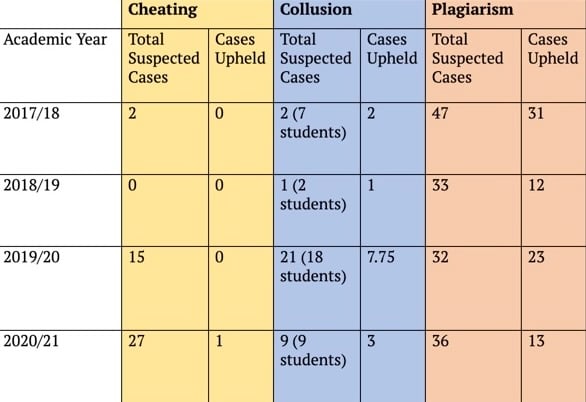The University of Oxford investigated 27 cases of suspected cheating in the academic year 2020/21, Cherwell can reveal. Of the 27 suspected cases, only one case was upheld.
This is a rise in the number of cases in the previous academic year during which there were 15 cases, and a significant increase in the number of suspected cheating cases before the Covid-19 pandemic. There were no suspected cases of cheating in 2018/19 and only 2 in 2017/18.
The number of cases of suspected collusion dropped from 21 last year to 9 this academic year, with only 3 being upheld. However, the first year of the Covid-19 pandemic saw 18 students involved in suspected collusion cases, a rise from only 2 students in 2018/19.
Suspected plagiarism cases remained this year high with 36 cases, following 32 cases in 2019/20 and 33 in 2018/19. 13 of the 36 suspected cases were upheld.
The majority of exams held by the University in Trinity term of this year were open-book assessments and were not invigilated. However, a small number of exams were conducted using the ‘Safe Exam Browser’ in Inspera which restricts the use of other applications and websites outside Inspera. The University did not make use of Inspera’s proctoring or monitoring features for exams and instead asked students to sign an exam honour code.
A spokesperson from the University told Cherwell: “Given the change in examination types, a change in the profile of misconduct referrals is to be expected, as students and staff adjust to new methods of assessments.”
They also said that the 27 cases of suspected academic misconduct referred to the Proctors Office “represents a very small fraction of the 55,000 exams sat, the vast majority of which were open-book exams.”
They added: “The cases referred to the Proctors’ Officer this year were considered under Regulation 1 of 2003. We can now confirm that eight of these cases were upheld as a breach/penalty, while 19 were referred back to Exam Boards. These Boards have a range of options available to them, in accordance with their exam conventions.
“The University is committed to the highest standards of assessments, and will continue to respond as appropriate in the future as we adapt our examinations based on our experience during the pandemic.”

An article by Dr Lancaster and student partner, Codrin Cotarlan, published in the International Journal for Educational Integrity earlier this year, found there was nearly a 200% rise in the number of homework and exam style questions posted online since the beginning of the pandemic, supporting the rise in the number of academic misconduct cases being investigated across the education sector.
Dr Thomas Lancaster, Senior Teaching Fellow in Computing at Imperial College London and specialist in academic integrity and contract cheating, told Cherwell that the rise in academic misconduct cases is in part due to the unsupervised manner in which assessments and exams have been carried out during the pandemic. He also said that “firms are marketing their offers very heavily to students, sometimes trying to disguise what they’re doing by calling this support”.
He believes that online learning was brought in quickly at the beginning of the Covid-19 pandemic without suitable consideration of online assessment and student support but that there is now time to find out what works best for institutions and students.
He added: “I don’t know if high pressure and high stakes exams are the answer. It is possible for students to cheat in a face-to-face setting. It’s possible for online exams to be invigilated. But ultimately, the higher the stakes, the more temptation there is for students to find ways to subvert academic integrity.
“Students this year have not had the same experience of taking in-person exams as those in the past and that’s just going to cause more anxiety. We have to ask if so much assessment has to be taken with such tight time pressures or if we can give students more freedom to research problems and work on longer-term assessments in areas of interest to them.”
Image: Sailko / CC BY-SA 3.0 via wikimedia commons


